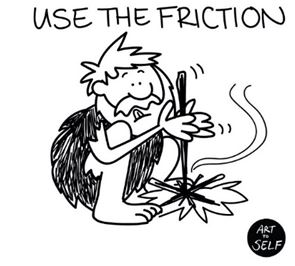Two former colleagues who are also science majors and friends of mine, have been raising and tagging butterflies for years. They volunteer their time and skills to a local university doing research on the migration patterns of the Monarch butterfly. A few years ago I had the pleasure of raising one for them with my boys, watching in amazement as the process of metamorphosis unfolded. It was a beautiful sight to behold. Every day I reveled at the small changes that occurred, until one day. I started feeling a bit tense and concerned at how long the body was lingering inside the chrysalis. I remember being in awe of its transparency. It was so vulnerable to anything outside and I hoped it would survive this seemingly endless struggle. I could see that the wings had developed, but still it took days before eclosion, finally breaking free from the chrysalis.

It reminded me of the story I had heard of boy who saw a butterfly struggling just as I had and he decided to take a pair of scissors and help the butterfly out by cutting it free. The butterfly died soon after its release because it needed to go through the entire metamorphosis. The time of struggle, was necessary in order for it to not just live for a few minutes but to fly and thrive in its short life. My friends explained how the entire body has to painfully break apart, obviously, because there isn’t’ much, if anything left of the caterpillar once it becomes a butterfly. It is not magic, it is the results and the reward of struggle. During this struggle inside the chrysalis the body is deconstructing and reconstructing. The final stage, when you think you can’t handle anymore, is when the juices or meconium is pumped into the veins of the butterfly. This meconium is what allows the butterfly to thrive. You can’t just cut out or disappear in the midst of a struggle or life challenge. Well you can, but you will end up with the same fate as the little boy’s butterfly. You have to go through the challenge to receive the reward. Imagine if you stopped short in the middle of a game or a marathon. What would happen? First, I imagine you would be disappointed with yourself, and then you would realize that you had also missed out on the inevitable lesson. Finally, you would not receive the reward that comes at the end of overcoming any challenge; the feeling of accomplishment, self-esteem, and competence for instance.
Why are we so averse to struggles and challenges? We say, “What doesn’t kill me makes me stronger,” but do we believe it when we are under the weight of it all? Why do some choose to give up when the going gets tough? Consider the weight of marriages or relationships in general, but also learning a new subject or technique? An Olympic gymnast didn’t get there without many failures, obstacles and injuries along the way. Without the struggle they wouldn’t develop the high level of skill that is required to succeed. Chess players, learning a musical instrument, body builders and pretty much any skill you can imagine requires struggle, if you care to be good at it at all. Michael Jordon said, “I have missed more than 9000 shots in my career. I have lost almost 300 games. On 26 occasions I have been entrusted to take the game winning shot… and missed. And I have failed over and over and over again in my life. And that is why I succeed.”
Developing muscle, skill, ability, knowledge; all of these require persistence, struggle, frustration and the ability to not give up when you reach the middle of your darkest hour or biggest hurdle. We need the ability to say and mean the following: “This is what I want and I will keep working my way through it until I get it. I will not settle for less than what I am capable of doing.”
As difficult as it is, if we can change our perspective in the moment and believe our self-talk we will see things start to shift.
Examples of motivational self-talk could be as follows:
- This sucks but I am not going to waste this pain
- I am not going to go through this in vain
- I will get a tutor if I have to
- I will go to therapy if you will
- It is too heavy to carry so I will ask for help
- I will survive and I will thrive because of it.
Examples of demoralizing self-talk could be as follows:
- This is too difficult
- Why do I have to suffer so much… while others don’t?
- I deserve better than this
- I don’t like this, it hurts too much
- It is too heavy to carry
- Who says I have to anyway? I can just put it down
- I can just disappear
- I can get a divorce
- I can do something else even if I don’t like it as much.
- I would prefer to take the easy road in life. I don’t care anymore.
Ask yourself: Do you want to love life or just get through it? Do you want to survive or thrive?
I am not making light of how incredibly hard life can be. I think of the many mental health patients I work with who would say it is not fair because life hasn’t given them the tools required for positive self-talk, let alone the ability to thrive through their struggles. If they survive they consider themselves lucky.
To this I say:
- Examine yourself
- Be self-aware
- Accept who you are in this life
- Do not compare yourself to others
- Be the kind of person that you are proud of
- Do your very best with whatever you have been given. If you are tone deaf would it make sense for you to believe and strive towards a career in the Opera?
Albert Einstein said… “Everybody is a genius. But if you judge a fish by its ability to climb a tree, it will spend its whole life believing that it is stupid.”
Love what you do, with what you have! Use your struggles and challenges to make you even better.



Hi, this is a comment.
To get started with moderating, editing, and deleting comments, please visit the Comments screen in the dashboard.
Commenter avatars come from Gravatar.
I like it
Thanks